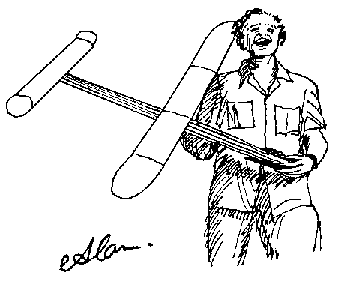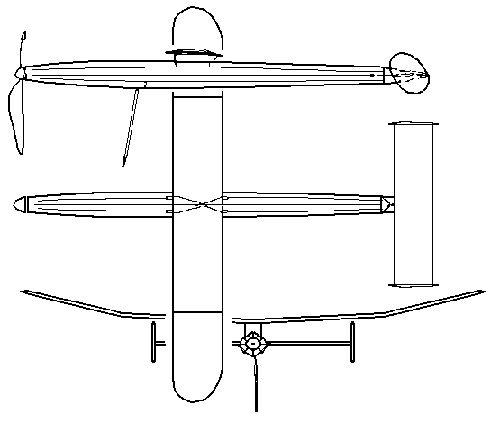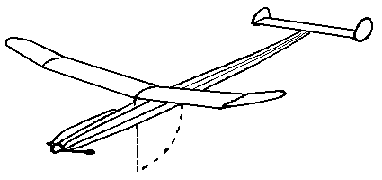Wakefield International Cup - A history from 1911 by Charles Dennis Rushing
1954 Alan King, 26, Australia
The World Championships was awarded to the United States of America, and the contests would be held at the US Air Force Base, Suffolk near West Hampton, Long Island, New York, on July 24 to 26. The Convair Aircraft Corporation was the sponsor of the combined Wakefield and FAI Power events, and General Jimmy Doolittle, Hero of the Tokyo Raid, and pilot of the "Gee Bee", that won the 1932 Thompson Trophy Race, was the Air Marshall of the contest. This year there would be only eleven Nations represented in the Wakefield Cup event: USA, UK, Canada, Australia, Guatemala, Mexico, Japan, Sweden, South Africa, New Zealand, Switzerland. There in person was Arne Blomgren the 1952 Wakefield Champion and Anders Hakanson, both still flying their original winning Wakefields! From Japan was Kiyotatso Miyoshe to fly his Wakefield, Andrew Bobkowski from Guatemala, and all the way from Australia, by tramp steamer, was 26 year old Alan King.
The USA Team included: Bob Dunham, Dick Baxter, Bob Debatty, and Warren Gillespie, the 1953 Wakefield Champion Joe Foster was not invited (?) I asked Joe about the tradition in the Wakefield Cup event that always, since 1928, required the Champion to defend their title. He told me that the AMA did not exercise this tradition, and he tried but did not win a place on the 1954 USA Team. So much for tradition. The Soviet Block Nations sent their regrets also, so much for friendly international competition.
On July 25, FAI Power day, the AMA's Technical Director, Carl Wheeley won the FAI Power Championships for Team USA, and the Team won the Franz Kluz Trophy again. This year there would be five rounds at 180 seconds each round. Rubber would be limited to 2.84 ounces, or 80 grams, total weight of the airframe 6.7 ounces, or 190 grams plus the rubber motor. Launching would continue to be ROG this year...
ROUNDS 1-5: Sunday, July 26, was Wakefield Day, and the weather was warm, and dry, with light winds. The USAF personnel provided an efficient retrieval service, chasing down and bringing back Wakefields in record time. There was one 180 second flight, in round 1, by Alan King, of Australia. Carl Hermes on the Proxy Team, flying Charles Jackson's Wakefield, had a 146 second flight. Alan King continued to score 180 seconds for every round to win the 1954 Wakefield Cup. The Leader Board please...
| Place | Name | Country | Round l | Round 2 | Round 3 | Round 4 | Round 5 | Total |
| 1 | Alan King | AUS | 180 | 180 | 180 | 180 | 180 | 900 |
| 2 | Charles Jackson (Carl Hermes) | GBR | 146 | 180 | 180 | 180 | 180 | 866 |
| 3 | Allan Lim Joon (Manuel Andrade) | AUS | 180 | 143 | 180 | 180 | 180 | 863 |
| 4 | John Upton (George Reich) | NZL | 180 | 180 | 180 | 124 | 180 | 844 |
| 5 | Bob Dunham | USA | 120 | 175 | 180 | 180 | 180 | 835 |
| 6 | Arne Blomgren | SWE | 180 | 146 | 180 | 128 | 180 | 814 |
| 7 | Philip Joyce | CAN | 180 | 180 | 141 | 180 | 125 | 806 |
| 8 | Fabi Mursep | ARG | 152 | 169 | 120 | 180 | 180 | 801 |
| 9 | Dick Baxter | USA | 180 | 180 | 177 | 180 | 81 | 798 |
| 10 | Warren Gillespie | USA | 123 | 138 | 180 | 180 | 150 | 771 |
Alan King was the top contestant in the Australian Wakefield Team eliminations, and was so determined to fly in the 1954 Wakefield International Cup Contest that he paid his own passage of $400.00 round-trip, on a tramp steamer bound for the USA; he was then a 26 year old chemist working in Melbourne. Winning the Wakefield Cup in 1954 forever changed this young man's life.
The Proxy Team was made up of the best Wakefield flyers of the time, they "out flew" the USA Team, they were: Carl Hermes, 1953 USA Team, for Charles Jackson (G); Manny Andrade, 1951 USA Team, for Allen Lim Joon (VH); George Reich, 1953 USA Team, for Jack Upton (ZL); Cliff Montplaisir, 1953 USA Team, for Hugh O'Donnell (G), the co-champion of the 1953 Wakefield Cup. Unhappily, Cliff was disqualified for pushing Hugh's Wakefield on the last flight. MAN editor Bill Dean captioned a photograph showing Cliff preparing to fly "Did Montplaisir push O'Donnell's model on disqualified round? Stupid. obsolete rule." Stupid (?) obsolete (?) why not do away with the undercarriage altogether (?) so they (FAI/ CIAM) did! If one listened I am sure that you could hear the bleating for "modernization! modernization! ." The sound of the bleating came mostly from the east, where tradition was meaningless. The "Antique, and Vintage Era", were coming to a close. By 1957 complete modernization of that old fashioned "gumiband" (Dave Thornburg's adjective) contest the Wakefield Cup event had taken place. Many veterans tried in a vain attempt to reawaken what they felt were the true Wakefields, thank God for SAM35 England. As with Dickens "Madam Defarge" the FAI/CIAM kept "fiddling, fiddling, always fiddling, the string of knots... kept growing...!" (IK: with FAI/CIAM responding to the other equally valid interests as summarised so well by Bill Dean. If no progress was required why was balsa wood allowed?)
| WINNING WAKEFIELD | ||
| component | inches | mm |
| wing | 49.28x4.81 | 1252x122 |
| tail | 20x3.75 | 508x95 |
| fuselage | 39.75 | 1010 |
| propeller | 20 dia 28 pitch | 508 dia 711 pitch |
| rubber | 1/4" 13 str Pirelli | |


References
A Tale of Two Cities, Fiction, Charles Dickens, Mdm Dufarge "...knitting, ting, always knitting..." (fiddling, fiddling, etc)
M.A.N. Nov 1954, Wakefield and FAI
Aeromodeller, June 1986, Yesterdays Wakefields, Martyn Pressnell
Aeromodeller Annual 1954
Music: "Mister Sandman"; Literature: "The Doors of Perception"; Cine: "On The Waterfront"
